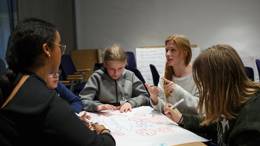Acceptance and commitment therapy (ACT)
ACT targeted support programmes are designed to help students to recognise and accept their emotions.

Acceptance and commitment therapy (ACT) is a form of talking therapy that lays emphasis on the acceptance of distress, to increase psychological flexibility and achieve greater life satisfaction.
ACT contains elements of more traditional cognitive behavioural therapies and uses acceptance and mindfulness strategies.
ACT targeted support programmes are designed to help students to recognise and accept their emotions and thoughts without judgment. They encourage students to commit to values-driven actions in the face of emotional challenges.
Programme information
This information refers to targeted mental wellbeing support programmes evaluated by the National Institute for Health and Care Excellence (NICE). Other programmes may vary in programme length and delivery method.
- Length: Three - eight weeks
- Delivered by: Psychologists and a Clinical psychology masters’ student
- Delivery method: Group
- Age: 11 – 19+
Targeted support programmes
ACT therapy should be delivered by trained professionals. The following directories are good places to start to identify an appropriately qualified practitioner:
Alternatively, there may be other ways to access services that deliver ACT or similar therapies in your local area. You can contact your local authority to find out what is available to your school or college.
If you are unsure who to contact at your local authority, try speaking to your Mental Health Support Team (if applicable), your trust leadership team, or your setting’s safeguarding or pastoral lead.
If you haven’t yet reviewed the targeted support guide, this will help you to consider which types of targeted support might be appropriate for your setting.
What does the evidence show?



